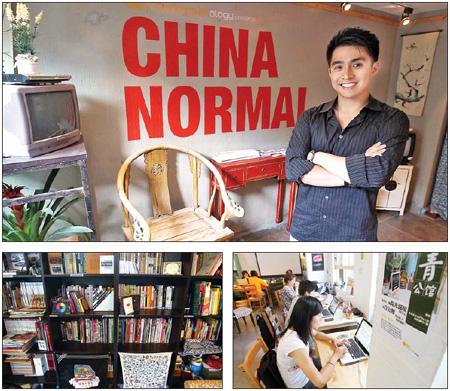
Clockwise from top: Kevin Lee says he wants to explore the thoughts, desires and aspirations of youngsters; Youthologists immerse themselves in research; Books and DVDs fill a corner of China Youthology's office. [Photos/China Daily]
In a concealed office on one of Beijing's oldest residential streets, some young entrepreneurs sit in a hutong courtyard house tapping away at computers as they delve into the secret lives of China's rising generation.
The 15 call themselves youthologists. Their goal is to help the business world better understand the needs and thoughts of China's young people by immersing themselves into the hundreds of subcultures flourishing throughout the nation.
The youth trend consultant group, called China Youthology, has been engaging the up-and-coming generation for more than two years, providing much sought-after marketing information on China's 18-35-year-old population to big international brands such as Nike and adidas.
"This generation of youth is the first that's starting to explore its own identity as individuals," said Kevin Lee, China Youthology's chief operating officer. "They are in this process right now of constructing individuality for the first time."
Their research explores growing trends ranging through interviews with people in the budding world of hip-hop music to the increasingly popular street basketball scene.
The company's most recent publicly-funded research paper, Reading a Book of Paradoxes: China Youth Trends and Business Implications, explores what makes China's young people feel connected with a brand, beyond price and accessibility.
Unlike most market research groups, the goal of China Youthology is not just to provide numbers and hard data, but also to actively engage in the cultures and help companies see Chinese youth as more than just consumers.
"We want to explore beyond the simple question of what they want to purchase," Lee said. "We want to understand the thoughts, the wants and the aspirations of the groups we study.
"We don't look at them like consumers but instead look at them first as individuals, as full people."
Through a sociology-based approach developed by Lisa Li, China Youthology's chief executive and founder, the company's employees, who each specialize in a different field such as music or fashion, take their research to the streets, conducting in-depth interviews, forming focus groups or simply hanging out with the nation's young.
"It takes time; it takes understanding," Lee said. "You can't simply walk up to a group of people, ask them a few questions and pretend to know what makes them tick. It takes getting to know them on a personal level."
The company's hutong office also acts as a creative exhibition center, opening its doors for the capital's emerging generation.
Hosting creative workshops and social gatherings, the members of China Youthology are able to become part of the culture they study while creating opportunities for the capital's youth to network and spread ideas.
"We live among young people," Lee said. "Our office is a creative workspace. It's an open door where people come in and interact with us and us with them."
But their efforts extend well beyond the borders of Beijing, with much of their research taking place in lower-tier cities where emerging youth markets are quickly being targeted by international companies.
"Beijing represents just a small percentage of the youth population. Lower-tier cities are where many of the emerging cultures are formed. It's important to give those people a voice as well," Lee said.
In late June, the youthologists will take those voices beyond the east with a summer tour to the United States where two of the company's top researchers will share with overseas audiences their insights into the quirky mannerisms of China's young.
"We want to share the insights we've gained with people from all walks of life," Lee said.





